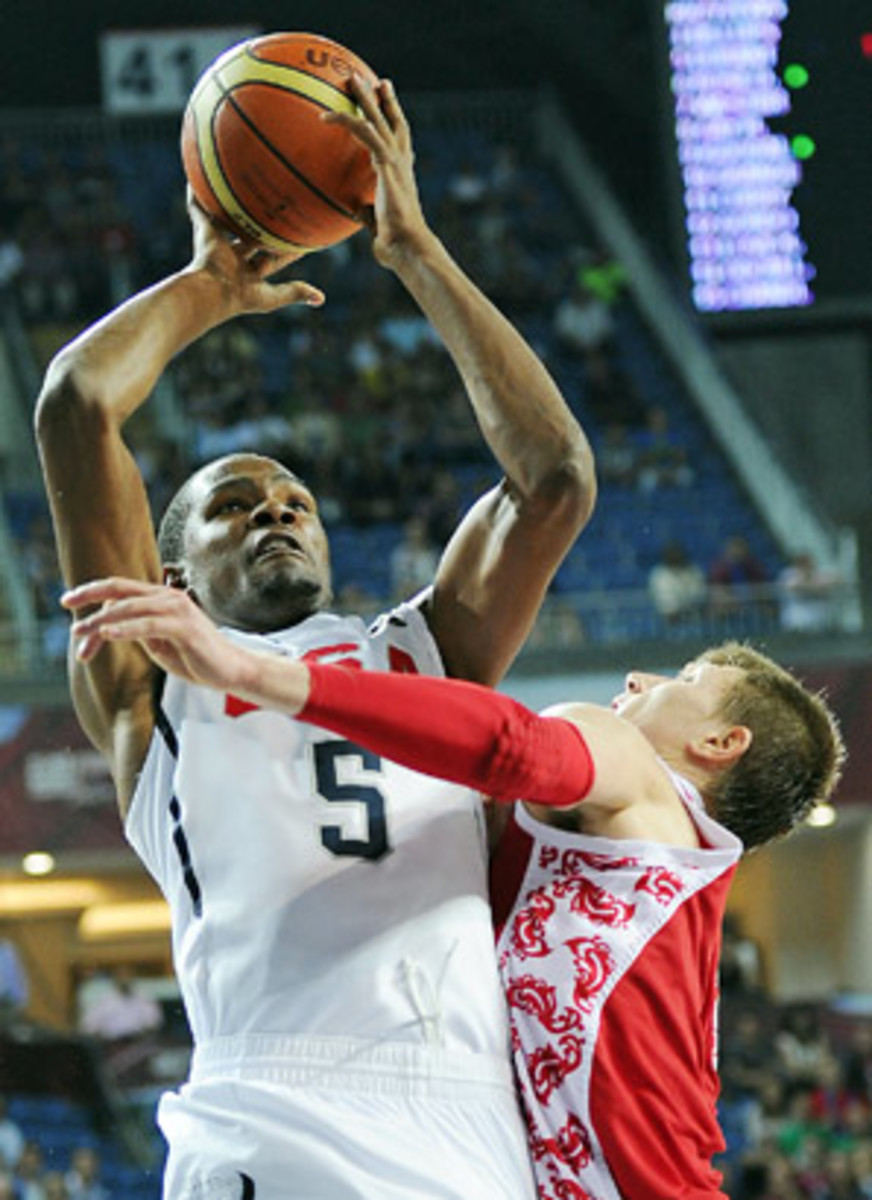Team USA faces familiar, but tougher, foe in semfinal matchup
"They can't shoot," the pundits roared. A 52.6 percent night from the field -- including 47.4 percent from three-point range -- in a 55-point rout of Angola in the Round of 16 proved otherwise.
"They're too inexperienced," they grumbled. Sure, the U.S. has six players who are 22 or younger and not a single representative from the 2008 Olympic Redeem Team. But those youthful knees refused to buckle in a two-point win over well-regarded Brazil in group play.
And what about size? Tyson Chandler is a string bean of a center and Kevin Love and LamarOdom are natural power forwards. Yet, the U.S. stood tall Thursday against a big and physical Russian team that towered over the Americans at virtually every position. The ambitious Americans didn't win the battle of the boards (Russia outrebounded them 45-37), but they didn't back down, coming up with key rebounds in critical moments of the 89-79 victory in the quarterfinals.
Outlasting the Russians wasn't easy, either. Backed by a simple but brilliant game plan -- pack the paint and bump and grind the U.S. guards as much as you can on the perimeter -- by coach David Blatt, and a well-schooled offense molded from Blatt's Princeton background, Russia opened a 35-30 lead midway through the second quarter. It capitalized on a lazy U.S. defensive effort by knocking down 4-of-7 three-pointers in the first 10 minutes and dominating the Americans on the offensive glass.
Fazed? Hardly. Kevin Durant's national team debut has become something of a fable; his performance against Russia added another chapter. With his buckets coming inside, outside and at the rim, Durant kept the U.S. from falling further behind in the second quarter and helped the Americans pull away in the second half. His shot 11-of-19 from the field for his 33 points, two short of Carmelo Anthony's World Championship team record set in 2006.
"There is no kid in the world that loves to play more than [Durant]," U.S. coach MikeKrzyzewski said. "As a result, he's becoming better and better and better. There is a lot of pressure on him because we're a young and everyone is pointing to him and overall he has responded in a truly magnificent way."
While Durant has earned his praise, so have his teammates. Team USA's pre-tournament camps in Las Vegas and New York were plagued with inconsistency, and even in group play the Americans appeared out of sync. Not so in the knockout round, where the U.S. has operated with laser-like precision, evidenced by the five turnovers it committed against Angola and the eight against Russia.
"In pool play, sometimes you try to make the home-run play -- a behind-the-back pass or a full-court outlet pass," Durant said. "We're just making the right play and are better at finishing. We still have a long ways to go in that area but we have gotten better since the first game."
There is little rest for the weary, however. Argentina was considered one of the favorites coming into the competition and Luis Scola's numbers (a tournament-high 27.9 points) had most pegging Argentina as a shoo-in for the final four. But the Argentines were cut down in a 19-point blowout to Lithuania, which the U.S. routed in an August exhibition. Suffice it to say, it is not the same team now.
"This is a different team," Chauncey Billups said. "[Linas] Kleiza is playing great. He's a tough matchup for anybody. They got a lot of shooters. They're playing with a different confidence level right now than they were a couple weeks ago."
Lithuania has a few familiar faces. Krzyzewski will recognize Martynas Pocius, the 6-foot-5 swingman who played on Coach K's Duke squad from 2005-09. The players won't have a hard time remembering Kleiza, either. Kleiza established himself as a valuable role player in four seasons with the Nuggets before bolting to Olympiacos last season, where he established himself as one of the best players in Europe. Kleiza, who signed with the Raptors this summer, is averaging a team-high 19.1 points at the World Championship.
Controlling Kleiza and Co. will be important, but for the U.S., this game can be won in the backcourt. Lithuania is loaded with shooters but short on quality ball handlers. The pressure defense the U.S. employed to force 18 turnovers against Russia should be equally effective against Lithuania. If the Americans can turn this game -- or any game for that matter -- into a track meet, it is to their advantage.
"They're looking for revenge," Andre Iguodala said, "and we're looking to make the next step toward a gold medal."
Indeed, a gold medal is within the U.S. team's reach. At this point, it appears each member of the team is keenly aware of that.





